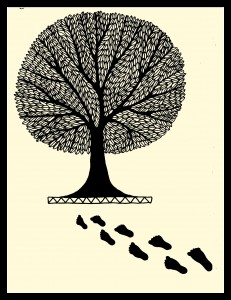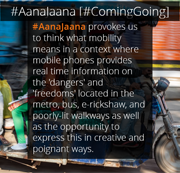“Let me take you back to the beginning of the organization, because we believe we are part of the new wave of feminism. That is a defining moment for us. We also call ourselves an autonomous women’s group-autonomous of political parties and government, and in terms of our decision making. When we started we did not really have any motive to say how a feminist organization should run, but we had some commitment to a very democratic collective structure. So we did not really have designations in the organization. Everybody did everything together and a lot of work was really shared collectively.”
-Abha Bhaiya, Founder Member, JAGORI
JAGORI started out as a collective, and basic commitment to issues was very clear at the outset. The challenge was taking feminist consciousness to rural areas, making activism and theory come close to each other, and how to work creatively, reaching out to the main constituency, women, majority of whom were not educated. New communication tools were developed, such as feminist songs, which are still central to JAGORI’s work. Another path-breaking endeavor was feminist training, a collective learning experience, where the methods used were not only participatory, but also based on women’s ways of learning.
Carrying the concerns and currents of women’s movements to an ever-widening network of groups and organizations is central to JAGORI’s work. In over two decades of JAGORI’s work, we have reached out to grassroots women leaders in the states of Bihar, Himachal Pradesh, Jharkhand, Madhya Pradesh, Orissa, Rajasthan, Uttar Pradesh and Uttaranchal.
In order to understand more about JAGORI’s work, read ‘Living Feminisms’, an illustrated history of JAGORI.
Jagori has in source 10,000 materials, 260 files and 800 films in its physical repository. Its body of work – documented and undocumented –includes feminist debates, articles, papers, photos. A feminist digital archival museum was initiated in December 2014 to curate 30 year old archives housed in Jagori. Explore this archive at www.livingfeminisms.org







